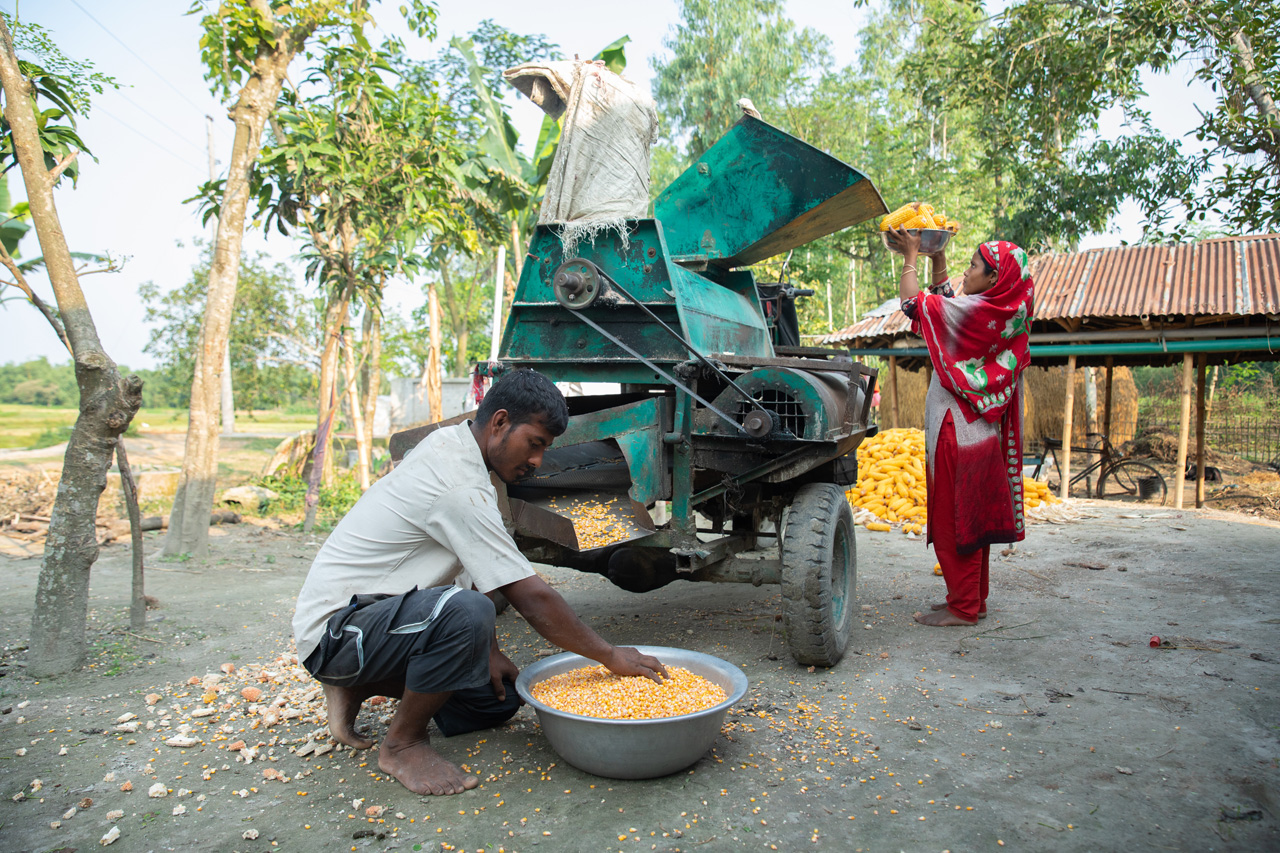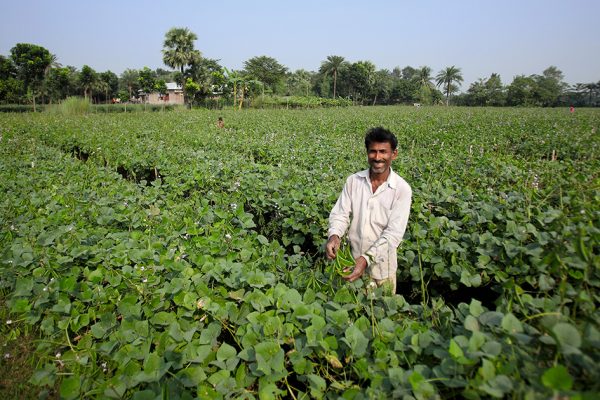‘New poor’: Ensuring inclusive growth amidst the new challenges of the pandemic
Reading Time: 4 minutes
24 million people, or 14% of the population, have been newly pushed into poverty as a result of the pandemic in Bangladesh. Learn how BRAC has introduced new interventions to ensure that this group can restart their lives as the country emerges from lockdowns, and build resilience for future shocks.
Johura Begum and her husband used to work at a garments factory in Chattogram, southern Bangladesh. Their collective incomes provided for their three children with ease, and allowed them to support their parents. Everything changed when the pandemic hit. The factory they worked at closed, leaving them both without two months of salary. They ran out of savings, could not pay rent, and debt started piling up.

Johura Begum in her new shop in Rangpur, northern Bangladesh. Photo credit: Abdullah Al Kafi © BRAC
Johura is one of the 24 million people in Bangladesh who newly fell into poverty as a result of the pandemic. Sudden job losses, interrupted value chains and drops in sales had direct and indirect effects on people, eventually causing many micro and small businesses to close.
People like Johura were dealing with poverty for the first time, which made them hesitant to ask for support. They used their savings, sold assets or borrowed money to deal with the immediate shock. Many migrated back to villages, unable to support themselves in urban areas. New approaches were required to work with them to restart their lives.
Read more: Adapting the Graduation approach for urban poverty
The first impacts were on women and young people
Young people, especially women employed in non-agricultural sectors, were the first to lose their jobs. One-third of the women who had jobs before the pandemic were still struggling to find jobs twelve months into the crisis. Unemployment was five times higher in households headed by women. Young people had to resort to informal jobs such as day labour to support their families.
Different effects on different professions
People in the ‘new poor’ category have varying needs. Micro and small business owners and migrant workers, particularly in the non-agricultural sectors, were some of the hardest hit economically. Skills gaps and integration challenges among these groups of people mean a blanket approach will not cater to their varied needs.
Migrant workers who returned from outside Bangladesh had the capital to start new ventures, but lacked basic skills in farming or running businesses. People who migrated within Bangladesh, like Johura, faced challenges in managing financial support due to a lack of social capital and the absence of collateral to guarantee repayment of credit.
“No one in my village wanted to lend us money, because we had lived away for so many years”, says Johura. “We lost all our connection with them – they feared that we might run off with the money”.
Read more: Distributing relief in a pandemic: Lessons learned about digital cash transfer during the COVID-19
Varying impact across geographies
People from the northern and southern parts of Bangladesh have varying magnitudes of needs. While the people involved in agriculture and livestock-rearing in northern regions were comparatively less affected by the pandemic, the southern regions in Bangladesh battled a super cyclone, affecting lives and livelihoods that the pandemic already rendered vulnerable.
Super cyclone Amphan affected over 10 million people in 19 coastal districts and caused USD 130 million worth of damage. People involved in shrimp hatcheries and betel leaf production were significantly impacted by the cyclone, as well as the pandemic-induced interruption of exports.
Support for varying challenges across diverse groups of people called for specially-targeted interventions
Based on insights taken from supporting the Government of Bangladesh in COVID-19 response, and BRAC’s experience of tackling the Rohingya crisis in Cox’s Bazar, the Ebola crisis in Liberia and Sierra Leone, and multiple natural disasters in Bangladesh, Nepal, Sri Lanka, Pakistan and Haiti, BRAC began designing customised interventions for the ‘new poor’.
These customised interventions, being implemented by BRAC’s Ultra-Poor Graduation programme, are now supporting thousands of people across 35 districts in Bangladesh.
People are equipped with financial support, technical coaching and support to access microcredit to develop sustainable businesses over a twelve month period. This is particularly helpful for people like Johura who could not meet the eligibility criteria to access finance from formal financial institutions.
Coaching is at the heart of the approach. Programme staff collaboratively develop business plans with the participants and guide them with technical coaching on how to operate their income-generating activities, or run their businesses. Participants are encouraged to pick their income-generating activities based on their interests, existing skills and potential.
Participants are guided to diversify their income by investing the loans in multiple earning sources. This helps to ensure effective investment of credit, minimise future risks, improves their ability to absorb shocks, and distributes benefits for longer term.
For Johura, this has meant going through an assessment of her current socioeconomic conditions, and discussing her skills and interest with the programme staff. She received a loan of BDT 50,000 (USD 587), opened a small shop and restaurant, and has also bought a calf.
The earnings from her shop and restaurant support her to meet her family’s daily needs and repay the loan in installments. Johura is raising the calf for longer term benefits – when it grows up, she can sell it for a larger sum of money.
“I want to slowly transform my restaurant into a big establishment – something that will make passersby stop and say ‘Johura from Chattogram opened this big restaurant’. This is now my dream”, Johura says.

Shefali Begum, another participant of the Ultra-Poor Graduation programme, working with a maize processing machine she bought with a loan from BRAC. Photo credit: Abdullah Al Kafi © BRAC
Family members are engaged in the process, encouraging participation by both women and men in the family. For instance, upon receiving the credit, participants invest in more than one income-generating activity and then divide the work with other family members to involve them in the earning process.
They are also encouraged to rebuild savings, to create a personal safety net to fall back on. For people like Johura, with fresh memories of having her savings depleted, that is an easy sell.
As of August 2021, over 80,000 people have been reached, and the work will continue throughout 2021 and 2022. BRAC will also continue working with people who were already in extreme poverty before the pandemic. To ensure inclusive growth in the long term on a larger-scale though, shock absorption capacity needs to be built – through changing systems, partnerships with government and non-government agencies, and adoption of proven resilience building models, such as the Graduation approach.
Rozina Haque is a Programme Head of the Ultra-Poor Graduation programme of BRAC and Ahona Azad Choyti is a Communications Specialist at BRAC Communications.
The Ultra-Poor Graduation (UPG) programme is recognised worldwide as the pioneer of the Graduation approach and acclaimed for its innovative and holistic solution to ultra-poverty. BRAC’s Graduation approach is a comprehensive, time-bound, integrated and sequenced set of interventions that aims to enable households living in ultra-poverty to achieve key milestones towards sustainable livelihoods and socioeconomic resilience, in order to progress along a pathway out of extreme poverty. Since it began in 2002, the programme has served over 2.1 million ultra-poor households in Bangladesh as of December, 2020.
Cover photo: Abdullah Al Kafi©BRAC





